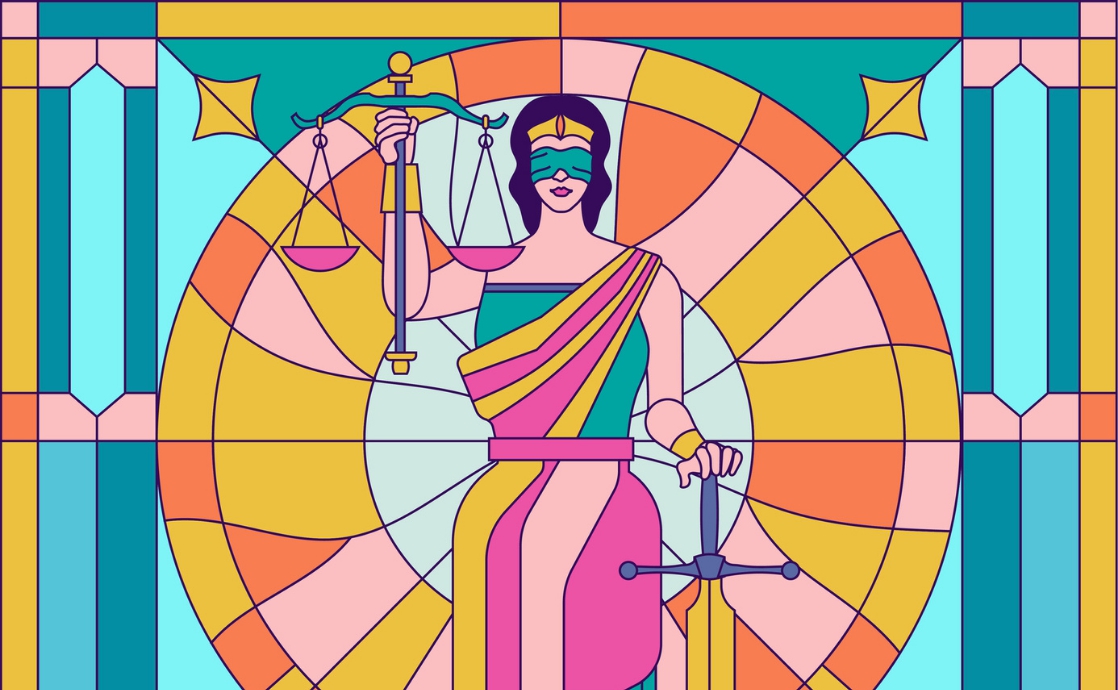The views expressed in our content reflect individual perspectives and do not represent the authoritative views of the Baha'i Faith.
Almost everything most people believe about justice is wrong.
We have been taught to think of justice as being a force outside ourselves, something we seek to assist us in time of need. So, we go to court to ask for justice if we have been wronged, in much the same way we might go to the store to buy food when we are hungry.
The Western concept of justice as something we want conferred on us can be traced as least as far back as 13 BCE, when the Roman Emperor Augustus created the goddess Justicia.
She was depicted as being clad in a classic toga, a sign of philosophical detachment, holding a balance scale in one hand, to weigh the merits of each side in a dispute, and a sword in the other, representing the power of swift and final action. You can see statues of Justicia, a common feature at the front of courthouse buildings throughout western Europe and the United States.
The concept of Baha’i justice is much deeper and more complicated than some invented-yet-impartial goddess dispensing fairness to those who seek her divine favor.
RELATED: Searching for the Definition of True Justice
Several years before the formal declaration of his prophethood in 1863, Baha’u’llah wrote a small volume of tersely-worded epigrams called The Hidden Words. The second one of those verses focuses on justice and contains some powerful clues about how that crucial social force impacts and influences humanity:
The best beloved of all things in My sight is Justice; turn not away therefrom if thou desirest Me and neglect it not that I may confide in thee. By its aid thou shalt see with thine own eyes and not through the eyes of others, and shalt know of thine own knowledge and not the knowledge of thy neighbor. Ponder this in thy heart how it behooveth thee to be. Verily justice is My gift to thee and the sign of My loving kindness. Set it then before thine eyes.
So, almost immediately, Baha’u’llah identified justice as that function of the human soul which enables us to know the difference between the truth and falsehood. This ability is crucial if we are to use fairness and justice to help us make the kinds of decisions that lead to the progress of humanity.
There are numerous references to justice – what it is and how it works – scattered throughout the Baha’i writings. Here are some brief samples:
- The purpose of justice is the appearance of unity among men.
- O people of God! That which traineth the world is Justice, for it is upheld by two pillars, reward and punishment. These two pillars are the sources of life to the world.
- No light can compare with the light of justice. The establishment of order in the world and the tranquility of the nations depend upon it.
Just from these examples, we can see that the Baha’i concept of justice has many features and facets: the unity of humanity, reward and punishment for personal behavior, and the maintenance of order in the world, to name only three things.
But the concept of justice in the Baha’i teachings is too important to be conveyed by a few of the quotations throughout the Baha’i writings.
Sometime around 1866 or 1867 – we don’t have an exact date – while he was living in exile in what is now Edirne, Turkey, Baha’u’llah wrote a work called The Paradise of Justice.
There is no officially approved translation of this tablet yet, but two Baha’i scholars have made a provisional rendition of the work, which appears to offer the most complete explanation so far of what Baha’i justice might look like.
So, thanks to the labors of Christopher Buck and Adib Masumian in provisionally translating and analyzing this tablet in Baha’i Studies Review, #20 in 2014, we can get a better idea of what constitutes Baha’i justice. To summarize their work, Baha’u’llah’s conception of justice operates on four levels:
1: Theological Justice
In The Paradise of Justice Baha’u’llah asserted that the creation of the universe was, in itself, an act of divine justice. When God ascended to the “throne of justice,” he wrote, the Almighty “fashioned all created things through a single word.” Additionally, one of the attributes of God is “the Just.” So, the very nature of justice itself begins as a divine concept, and one that – through the prophets of God – transfers down to humanity.
2: Justice as a Product of Divine Revelation
The role of each prophet is to transmit God’s will to humanity, the Baha’i teachings explain. As such, Baha’u’llah declared that: “The essence of justice and the source thereof are both embodied in the ordinances prescribed by Him Who is the Manifestation of the Self of God amongst men.”
RELATED: Achieving Justice Through the Radical Notion of Oneness
3: Justice – the Basic Principle of Governance
Baha’u’llah lived and wrote at a time when monarchy was the prevailing form of rule in the countries of the world. So, his governance instructions were directed to kings and emperors as the source of political and social power on the planet, but they apply to all who wield power. In The Paradise of Justice, he wrote that the rulers of the various countries must “act with equity and complete sincerity towards their subjects, and decree for them what God Himself hath decreed in His mighty and everlasting Book.”
4: A Justice-Centered Personal Standard of Behavior
Baha’u’llah instructed the peoples of the world to “adorn themselves … with the raiment of justice, inasmuch as the exercise thereof befitteth all mankind.”
By studying and analyzing Baha’u’llah’s tablet on justice, it becomes clear that justice is not some mysterious external force, such as luck, but must be considered a fundamental, integral feature of human behavior.
Ultimately, the triumph of justice depends on how well the members of the human race can understand and practice the positive character traits and inner spiritual qualities that lie at the heart of the Baha’i writings.
















Comments
Sign in or create an account
Continue with Googleor